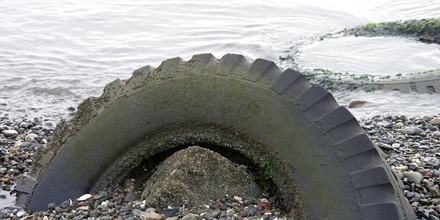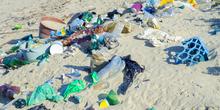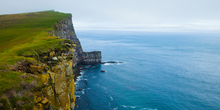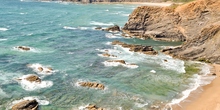Water, Marine & Fisheries
Our Work
Latest in Water, Marine & Fisheries
-

IEEP contributes to free online course on marine litter for United Nations Environment
The United Nations Environment’s second Massive Open Online Course (MOOC) on marine litter was created to educate participants at all levels and backgrounds to take action on marine ...
-
Tackling marine litter with the circular economy and the EU Plastics Strategy
IEEP identifies how the EU Plastics Strategy and Circular Economy Action Plan provide a unique opportunity to address marine litter and its impacts.
-
Plastics, Marine Litter and the Circular Economy
Briefing and three product fiches explore circular economy solutions for reducing the flow of plastic waste into the oceans.
-
Socio-economic benefits of EU Marine Protected Areas
They are more than just a nature conservation tool – a study by IEEP shows how EU Marine Protected Areas help to maintain and improve the provision of a wide range of ecosystem services and related socio-economic benefits.
-
New report: assessing the benefits of marine protected areas
Marine Protected Areas provide a range of benefits to human wellbeing, including providing food, mitigating climate change and creating opportunities for recreation and tourism. Further steps are needed to assess and communicate these benefits, this way supporting marine conservation both globally and in the EU.
-
Benefits of marine protected areas in the context of EU’s Natura 2000 network
A scoping study by IEEP outlines a step-wise methodology to assess the overall benefits provided by the EU’s marine Natura 2000 network.
-
New open access book on marine litter
A new book, 'Marine Anthropogenic Litter', has been published comprising 16 chapters on various aspects of the complex issue of litter in the world’s oceans. Researchers from IEEP contributed a chapter on the economics of marine litter. The whole book is free to view online.
-
Paper on the challenges of taking account of long timescales in the management of Europe’s regional seas
There many physical, biological and social characteristics of marine systems which are slow to change. Understanding these is important if marine managers are to develop effective targets and measures to deliver environmental improvements.
-
Access IEEP’s definitive guide to European environmental policy
The award-winning Manual of European Environmental Policy is now available on IEEP’s website. This archive provides free access to the definitive guide to the development of European environmental policy.
-
The Manual: Chapter 1 - Policy framework
This is a chapter of IEEP’s Manual of European Environmental Policy. In this chapter, the reader is introduced to European environmental policy, EU institutions and agencies, and the development of EU treaties.
-
The Manual: Chapter 5 - Water and marine
This is a chapter of IEEP’s Manual of European Environmental Policy. In this chapter the development of EU water pollution policy is explored, including the Water Framework Directive, the Marine Strategy Framework Directive, and other directives and policies covering flooding; water scarcity; and dangerous substances in water.
-
Challenges of achieving good environmental status in the Black Sea
Achieving Good Environmental Status in the Black Sea is particularly challenging due to governance structure. This paper explores this in relation to eutrophication and fisheries management.
-
Guidelines for biodiversity proofing the EU budget
This report provides a practical framework to ensure that spending under the EU budget has no negative impacts on biodiversity, and that spending under the EU budget is overall supportive to achieving the biodiversity targets.
-
Greener Britain: Practical proposals for party manifestos from the environment and conservation sector
A coalition of the UK’s leading environmental groups, including IEEP, is calling for all political parties to commit to a greener Britain by 2020 by pledging seven major priorities to reform the way we use energy, build communities and protect nature.
-
Biodiversity proofing of the EU budget
This study shows how more can be done to firstly avoid and minimize detrimental impacts of EU funding on biodiversity, and secondly to increase biodiversity benefits.
-
New report: The Economics of Ecosystems and Biodiversity for Water and Wetlands
This new IEEP-led report presents insights on the importance of wetlands in delivering ecosystem services that are needed to support human life, and also for people’s livelihoods and the world’s economies. The report shows that demonstrating and using the values of ecosystem services related to water and wetlands can lead to better informed, more cost-effective, and fairer decision- making.
-
The Economics of Ecosystems and Biodiversity for Water and Wetlands
This new IEEP-led report presents insights on the importance of wetlands in delivering ecosystem services that are needed to support human life, and also for people’s livelihoods and the world’s economies. The report shows that demonstrating and using the values of ecosystem services related to water and wetlands can lead to better informed, more cost-effective, and fairer decision- making.
-
The Ecosystem Approach in Marine Management
The Marine Strategy Framework Directive requires Member States to apply an “ecosystem approach to marine management”. This report defines the ecosystem approach and puts it into context by describing the challenges of applying it across Europe’s seas.
-
Paper on the Proposed Marine Strategy Directive Published
Volume 12 of the Journal of International Maritime Law contains a paper by IEEP's Andrew Farmer on the proposed EU marine strategy Directive, including details of its contents and development and how it ...
Highlights
-

Plastics, Marine Litter and the Circular Economy
Briefing and three product fiches explore circular economy solutions for reducing the flow of plastic waste into the oceans.
-

Socio-economic benefits of EU Marine Protected Areas
They are more than just a nature conservation tool – a study by IEEP shows how EU Marine Protected Areas help to maintain and improve the provision of a wide range of ecosystem services and related socio-economic benefits.
-

Benefits of marine protected areas in the context of EU’s Natura 2000 network
